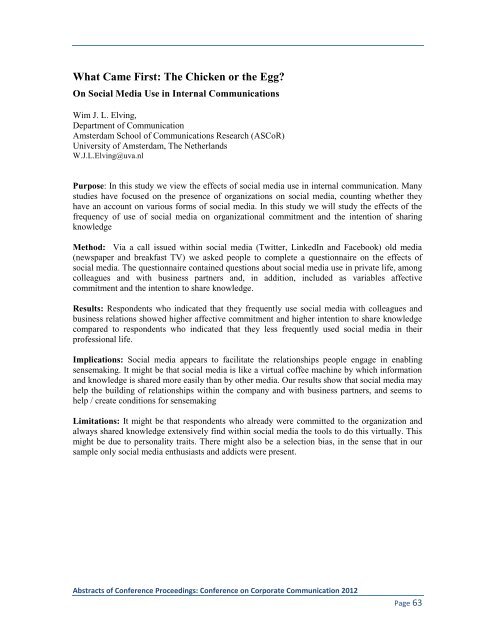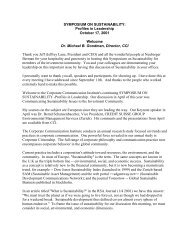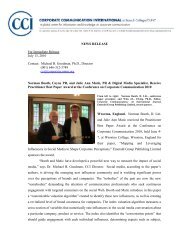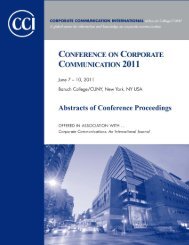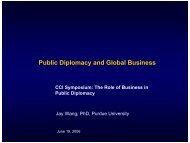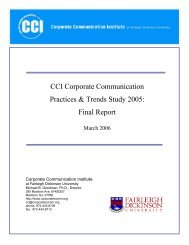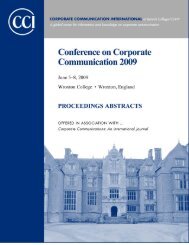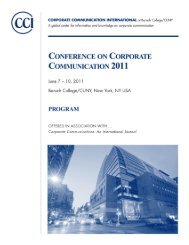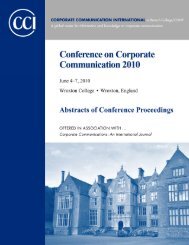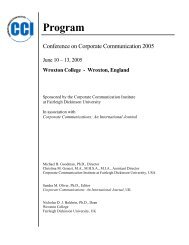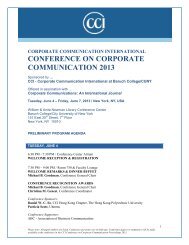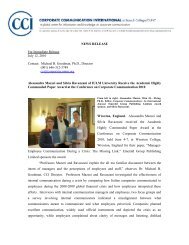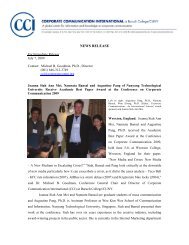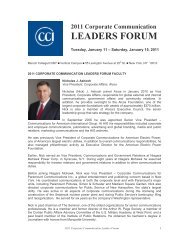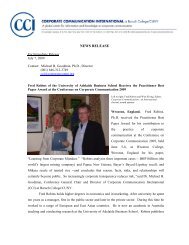Proceedings: Conference on Corporate Communication 2012 Page 1
Proceedings: Conference on Corporate Communication 2012 Page 1
Proceedings: Conference on Corporate Communication 2012 Page 1
You also want an ePaper? Increase the reach of your titles
YUMPU automatically turns print PDFs into web optimized ePapers that Google loves.
What Came First: The Chicken or the Egg?<br />
On Social Media Use in Internal Communicati<strong>on</strong>s<br />
Wim J. L. Elving,<br />
Department of Communicati<strong>on</strong><br />
Amsterdam School of Communicati<strong>on</strong>s Research (ASCoR)<br />
University of Amsterdam, The Netherlands<br />
W.J.L.Elving@uva.nl<br />
Purpose: In this study we view the effects of social media use in internal communicati<strong>on</strong>. Many<br />
studies have focused <strong>on</strong> the presence of organizati<strong>on</strong>s <strong>on</strong> social media, counting whether they<br />
have an account <strong>on</strong> various forms of social media. In this study we will study the effects of the<br />
frequency of use of social media <strong>on</strong> organizati<strong>on</strong>al commitment and the intenti<strong>on</strong> of sharing<br />
knowledge<br />
Method: Via a call issued within social media (Twitter, LinkedIn and Facebook) old media<br />
(newspaper and breakfast TV) we asked people to complete a questi<strong>on</strong>naire <strong>on</strong> the effects of<br />
social media. The questi<strong>on</strong>naire c<strong>on</strong>tained questi<strong>on</strong>s about social media use in private life, am<strong>on</strong>g<br />
colleagues and with business partners and, in additi<strong>on</strong>, included as variables affective<br />
commitment and the intenti<strong>on</strong> to share knowledge.<br />
Results: Resp<strong>on</strong>dents who indicated that they frequently use social media with colleagues and<br />
business relati<strong>on</strong>s showed higher affective commitment and higher intenti<strong>on</strong> to share knowledge<br />
compared to resp<strong>on</strong>dents who indicated that they less frequently used social media in their<br />
professi<strong>on</strong>al life.<br />
Implicati<strong>on</strong>s: Social media appears to facilitate the relati<strong>on</strong>ships people engage in enabling<br />
sensemaking. It might be that social media is like a virtual coffee machine by which informati<strong>on</strong><br />
and knowledge is shared more easily than by other media. Our results show that social media may<br />
help the building of relati<strong>on</strong>ships within the company and with business partners, and seems to<br />
help / create c<strong>on</strong>diti<strong>on</strong>s for sensemaking<br />
Limitati<strong>on</strong>s: It might be that resp<strong>on</strong>dents who already were committed to the organizati<strong>on</strong> and<br />
always shared knowledge extensively find within social media the tools to do this virtually. This<br />
might be due to pers<strong>on</strong>ality traits. There might also be a selecti<strong>on</strong> bias, in the sense that in our<br />
sample <strong>on</strong>ly social media enthusiasts and addicts were present.<br />
Abstracts of <str<strong>on</strong>g>C<strong>on</strong>ference</str<strong>on</strong>g> <str<strong>on</strong>g>Proceedings</str<strong>on</strong>g>: <str<strong>on</strong>g>C<strong>on</strong>ference</str<strong>on</strong>g> <strong>on</strong> <strong>Corporate</strong> Communicati<strong>on</strong> <strong>2012</strong><br />
<strong>Page</strong> 63


